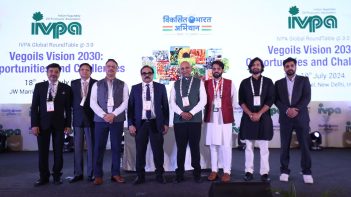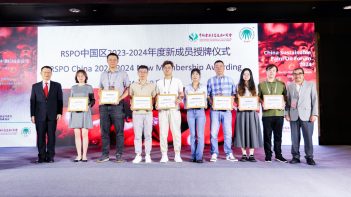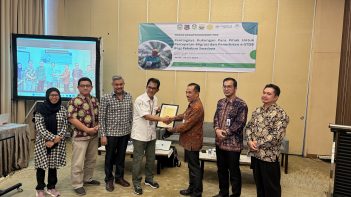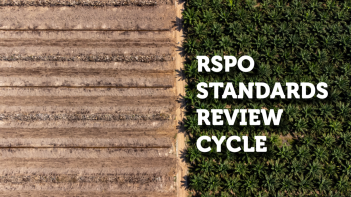Kuala Lumpur, MALAYSIA, 7 December 2022: The Roundtable on Sustainable Palm Oil (RSPO) supports global efforts to tackle deforestation and forest degradation, including those by the European Union (EU) to ensure that products entering the EU market are not linked to these practices. On 6 December 2022, the European Parliament and the Council of the EU reached a provisional agreement on the proposed Regulation on Deforestation-free products, which will now include palm oil, beef, timber, coffee, cocoa, rubber and soy.
The rules will also apply to a number of derived products including selected palm oil-based derivatives (used for example as components in personal care products), with a review to be carried out in two years to see if other products should be covered. RSPO notes with concern that the inclusion of derivatives will make it burdensome for companies to comply with the regulation within the foreseen timeline of 18 months (24 for small and micro enterprises).
Throughout the legislative process, RSPO has called for the proposal to be strengthened to prevent deforestation-leakage to other markets that have lower social and environmental standards and to ensure that the regulation EU does not cause unintended harm to people in the process.
“We are content that our appeal to increase the implementation period from 12 to 18 months has been considered. This implementation period is needed to ensure that smallholder farmers can meet legislative requirements and be maintained in the European supply chain, so as not to threaten the socio-economic development that sustainable palm oil has brought to millions of smallholder farmers and vulnerable communities,” says Inke van der Sluijs, Director Market Transformation, Roundtable on Sustainable Palm Oil.
RSPO recognises the importance of traceability to demonstrate sustainable production and the need for companies to collect geographical information on the farmland where the commodities that they source have been grown, so that these commodities can be checked for compliance. “But additional support for smallholders is still needed to avoid damaging side effects and the impact of the regulation on smallholders should be assessed very carefully,” van der Sluijs reiterated. Millions of smallholder farmers in rural areas in Indonesia, Malaysia, Papua New Guinea, Thailand, Africa and Latin America, need to be reached, informed, equipped and trained. To support smallholders in this transition, companies must work in collaboration with local authorities, NGOs, and local supply chain actors.
Other elements of the agreement include a cut-off date of 31 December 2020, the number of checks by competent authorities, and obligations of operators and traders. RSPO supports the intent of the agreement to avoid duplication of obligations, reduce administrative burden for operators and authorities and to add the possibility for small operators to rely on larger operators to prepare due diligence declarations.
RSPO is confident that its voluntary certification standard will be an important tool for companies in doing their risk assessment and provide a clear contribution to their compliance with the EU regulation.
As one of the most robust agricultural standards worldwide, requirements to halt deforestation are central to the RSPO Standards for growers. In Europe, 93% of palm oil imports used for food, feed, cosmetics and cleaning products is already certified sustainable palm oil.
RSPO will continue to evaluate the implications of the regulation for the different actors in the palm oil supply chain against its internal processes, procedures and standards in order to support its members in the best possible way.
RSPO calls on all parties involved to ensure that steps to ensure forest protection and restoration are achieved in a truly holistic and sustainable way.
About RSPO:
The Roundtable on Sustainable Palm Oil (RSPO) was formed in 2004 with the objective of promoting the growth and use of sustainable oil palm products through credible global standards and engagement of stakeholders. RSPO is a not-for-profit, international, membership organisation that unites stakeholders from the different sectors of the palm oil industry including oil palm producers, palm oil processors or traders, consumer goods manufacturers, retailers, banks and investors, environmental or nature conservation NGOs, and social or developmental NGOs.
This multi-stakeholder representation is mirrored in the governance structure of RSPO such that seats in the Board of Governors, Steering Committees and Working Groups are fairly allocated to each sector. In this way, RSPO lives out the philosophy of the “roundtable” by giving equal rights to each stakeholder group, facilitating traditionally adversarial stakeholders in working together to reach decisions by consensus, and achieving RSPO’s shared vision of making sustainable palm oil the norm.
The seat of the association is in Zurich, Switzerland, while the secretariat is currently based in Kuala Lumpur with satellite offices in Jakarta, London, Zoetermeer, Beijing, Bogotá and representation in Europe.
For further information, kindly contact:
| Kim Williams
Communications Manager, Europe |
RSPO Communications Team
|
Keep reading

Save the Date: The 21st General Assembly (GA21) of RSPO Members
Interim Measure for Requirements 5.1.5 and 5.1.6 of RSPO Rules on Market Communication and Claims 2022

RSPO Partners with Indian Vegetable Oil Producers’ Association (IVPA) to Promote Sustainable Cultivation and Palm Oil Imports in India
Call for Expression of Interest: Independent Investigation of a Complaint

2024 China Sustainable Palm Oil Forum Calls for Bold Action on Supply Chain Sustainability
Reminder: Important Updates on Shared Responsibility

Smallholder Inclusion in Indonesia: Over 1,000 Farmers Registered in RSPO Pilot Districts




